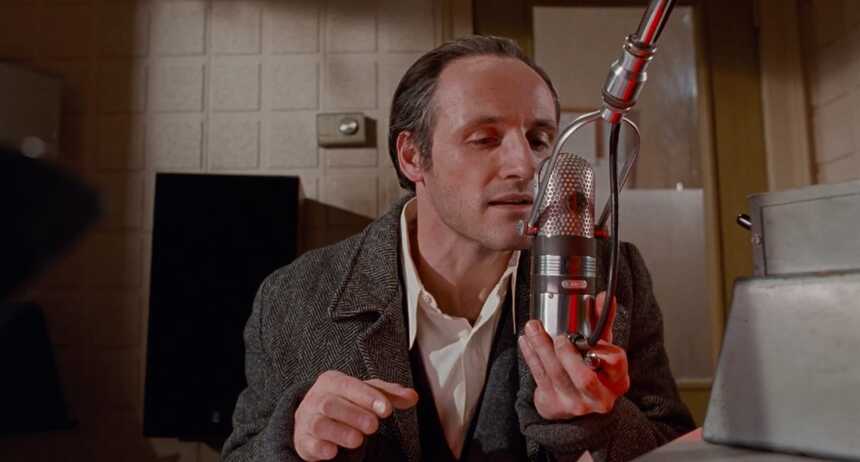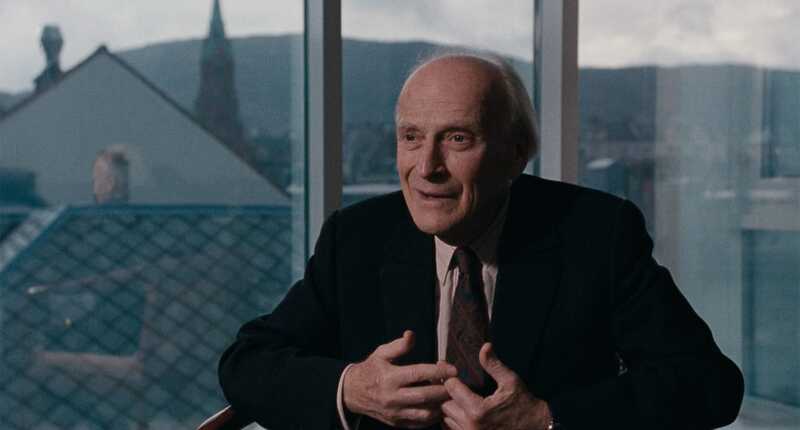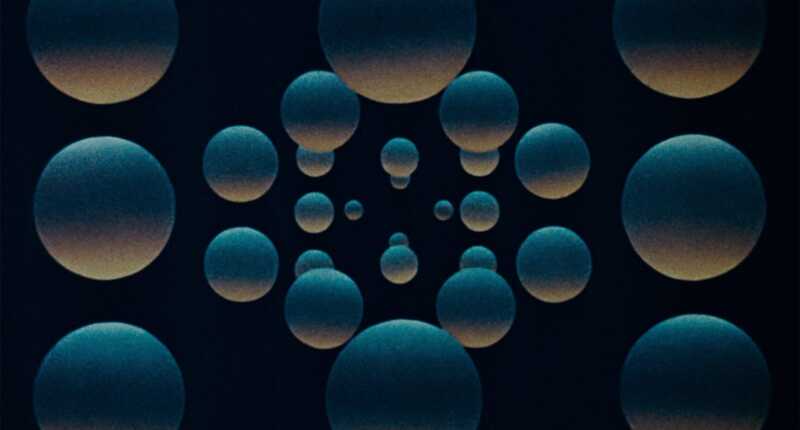THIRTY TWO SHORT FILMS ABOUT GLENN GOULD Blu-ray Review: The Contrapuntal Biopic
François Girard's groundbreaking biography of the great pianist, coming soon from Criterion

Biopics usually follow one of two structures: the majority giving a general, sweeping account of a person's life, with various scenes focusing on 'important' events that would likely already be known by the audience; these are stories or breadth, not depth, and usually don't really help us understand the biopic's subject since it ends up being a rather superficial overview. The second structure, focuses on a particular event, or a few; this is the better option, but it can also try to suggest that we can know the entirety of a person by a single point in their life.
And then there are the rare exceptions that go in a different direction, the biopics that know that we can never fully understand the subject, can never truly see from their perspective. But maybe we can stand inside the circle of their lives for a time, see them through seemingly random moments to gather some (though) not all of the puzzle pieces. Such biopics offer, at least in my opinion, a more satisfying cinematic experience.
Such a unicorn of a biopic is Thirty Two Short Films About Glenn Gould. Directed by François Girard (The Red Violin), co-written by him and Don McKellar (Blindness, Last Night), starring Colm Feore (Thor, Titus), this story of one of Canada's most famous musicians, one of the greatest pianists of all time, eschews any conventional categorization. It's there in the title: a series of short films, loosely strung together in semi-aging order (but not strictly), with an actor performing the role of Gould (but there are interviews with some of his friends and colleagues), plus some moments of animation, others performing his work, and sequences with just images of ... pills?
Given Gould's short yet seemingly active life, a standard biopic structure could have been formulated. But Girard understood, this would not work for an artist such as Gould. While his picture would fit well next to a dictionary definition of 'eccentric artist', that would also too easily dismiss what a unique figure he was. Gould himself kept dozens of journals, produced documentaries, wrote essays; a series of shorts, or vignettes, would be the best way to understand how Gould's mind and soul worked. And while the ones that show Feore as Gould appear more or less in chronological order (from childhood to just before his death), interspersing these moments with interviews or visual interpretations of his music, help us understand that complete understanding is impossible; pieces of his essence must be understood in this semi-contrapuntal form.
We have the necessary introduction to know the two most important points to understand Gould: he was taught music by his mother, who emphasized listening to recordings as opposed to going to live concerts; and his attachment to the solitude of his Lake Simcoe-adjacent home. Two images of Gould, first with a shot that will repeat at the end of him on the ice, and another with Feore in a chair, recreating a well-known photo, acclimatize the audience to the actor as the pianist.
Some of these shorts show what could be called a specific, important moment: a recording session in New York; backstage at his final public concert in Los Angeles; recording narrative for his documentary 'The Idea of North'. Others are more private moments: him reading what seems to be a personals ad; having lunch at a diner where he listens to the 'music' of the people around him. Some are atypical reenactments, such as Gould interviewing himself on his attitudes to music, or his side of another interview while at a motel in Wawa, or the day he apparently was the only person to make money on a particular stock.
 Feore might be more well-known to world audiences with his roles in various Marvel films, but he is also one of Canada's premiere Shakespearean actors, one capable of portraying Gould and grounding his eccentricities, giving his linguistic specificity the life and enunciation it necesitates. Feore gives us the private Gould, the man who loves the common man he found in the hotel chambermaid, the stage crew, the truckers at a highway diner. Also the public Gould, who would somewhat perform (on the piano and otherwise), but who nonetheless adhered to his strict perfection, imposed on himself. Feore understands that each of these shorts shows us a different side of the man, and adjusts accordingly to the moment. It's often subtle, but it takes an actor of Feore's calibre to pull it off. It's an interpretation that Feore envelopes and conveys, tuning (pun intended) how he presents Gould different, for the needs of each short in which he appears.
Feore might be more well-known to world audiences with his roles in various Marvel films, but he is also one of Canada's premiere Shakespearean actors, one capable of portraying Gould and grounding his eccentricities, giving his linguistic specificity the life and enunciation it necesitates. Feore gives us the private Gould, the man who loves the common man he found in the hotel chambermaid, the stage crew, the truckers at a highway diner. Also the public Gould, who would somewhat perform (on the piano and otherwise), but who nonetheless adhered to his strict perfection, imposed on himself. Feore understands that each of these shorts shows us a different side of the man, and adjusts accordingly to the moment. It's often subtle, but it takes an actor of Feore's calibre to pull it off. It's an interpretation that Feore envelopes and conveys, tuning (pun intended) how he presents Gould different, for the needs of each short in which he appears.
The non-narrative moments, however, are just as important to understanding who Gould was. Whether it be Norman Maclaren's animation, a seeming x-ray of Gould as he plays, the list of his various pills, or interviews with people who knew him, either through work or as family, it all adds to his life. Girard and his team understand that there is no way to solely know a person through one form or another, particularly a person as varied as Gould was. To understand the man, we also must understand how he thought about, composed, and performed music. Each piece was carefully selected by Girard for each short, fitting into the timing and mode.
What emerges is the most perfect mosaic: one that enhances what we already know, seeks to perhaps fill in a few blanks, but also looks at the spaces between, the alleyways of a personality, the nuances and moments that in any other film might be edited out (I think particularly of the scene in a hotel in Hamburg, when Gould insists that a chambermaid sit with him and listen to his newly arrived record; what a precious moment to see the man full of joy, and wanting to share that joy with a stranger). Thirty Two Short Films About Glenn Gould remains not only one of the great biopics, but one of the most unique films, one that seeks rather than answers, one that explores rather than concludes, one that presents its subject in intimacy and frustration, haughtiness and joy. It remains a remarkable achievement.
Special Features
The edition comes with both a Blu-ray and a 4K, presenting in the original aspect ratio of 1:85.1, with a remastered soundtrack from the 35,, magnetic tracks. It captures the warmth of the film, its intimacy of colour and life, energy and gorgeous score. It's the kind of fillm, especially now with this restoration, that one could either mute and watch, or close one's eyes and listen; either of these would still give a rich enjoyment of the mosaic collected of Gould's life.
The insert is one of my favourite types, the kind that unfolds, with its accompanying essay and credit details on one side, and on the flipside, a layout of each of the short films, with its title and a corresponding image. It's worth considering having it framed for display. The essay by Michaekl Koretsky is a good introduction to the 'extras' (in that, I would recommend reading it first, then watching the interviews and documentaries), especially as it gives a better background to François Girard's filmography and directorial engagement, as well as some details about the composition choices, and how Girard's framing of Gould's story is as finely tuned as Gould's pianos.
The three interviews offer more personal incite and anecdotes. First, having Atom Egoyan interview François Girard works very well to understand the movement of Canadian cinema in the 1990s of which they were both apart; how English and Quebecois cinema stood on two sides of a fuzzy line, and how the filmmakers on each side would borrow from each other. And understanding how it was the right decision for a Quebecois filmmaker to make a film about an English Canadian icon. Girard discusses how he developed the concept and structure of the film, working with co-screenwriter Don McKellar, and working with actor Colm Feore.
The interview with Feore himself reveals how actors in general approach playing in a biopic, as well as Feore's individual experience with someone like Gould. Notable is how he relates a very different memory of his audition experience from producer Niv Fichman, who also relates how Rhombus Media was founded in part to make a film about Gould.
The greatest treasures of the special features are two archival CBC/NFB documentaries. Glenn Gould On the Record showcases Gould's work in the recording studio, one in New York City, parts of which are interpreted in the film. It's fascinating to watch how Gould would interact with the engineers, how he wanted his piano to be set up (he was unique in choosing a low chair and crossing his legs while playing, for example, what appears to be an uncomfortable position but somehow worked for him), how the engineers themselves worked with the eccentricities of the performer. Glenn Gould Off the Record shows more of Gould's private life in his small Ontario town, and it's eerie to understand how well Feore performed the role one you see footage of the real pianist. In both these documentaries, we understand how Thirty Two Short Films About Glenn Gould (rightly) acts as an interpretation of the man and his world, rather than trying to be an imitation.
Thirty Two Short Films About Glenn Gould will be released on June 24th, 2025.
Thirty Two Short Films About Glenn Gould
Director(s)
- François Girard
Writer(s)
- François Girard
- Don McKellar
- Glenn Gould
Cast
- Colm Feore
- Derek Keurvorst
- Katya Ladan








